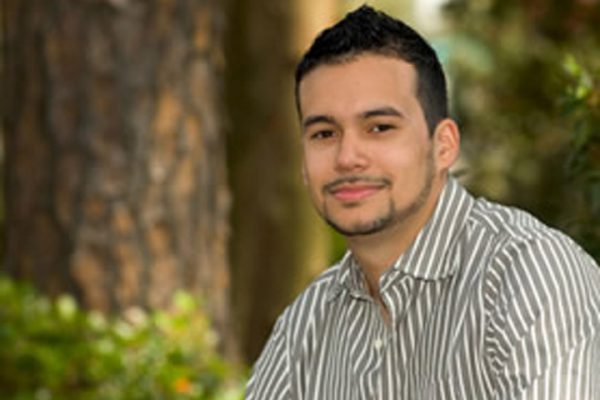
“Biomedical engineering has allowed me to focus on the technical, engineering aspects and has given me the opportunity to promote the health of others, which is truly my career goal.”
“When I was two years old, my parents, sister, and I came to the U.S. from Nicaragua, which has a lot of poverty and government corruption. Remembering the struggles my parents went through to bring us here keeps me going—to make something of myself. Their support throughout these four years at Florida State has been invaluable and reminds me how much they mean to me,” says José Muñiz, a senior who is carrying an Honors in the Major in Biomedical Engineering.
As a child José had wanted to become a doctor, but as he matured he developed an interest in Mathematics and Chemistry. Here at FSU he is majoring in Chemical Engineering with an emphasis in Biomedical Engineering, a field that combines the design and problem solving skills of engineers with medicine and biology to create healthcare equipment, from glucose monitors to MRI and electro-cardiogram machines.
Assistant professor of Chemical Engineering, Samuel Grant—”an all-around great guy”—introduced the idea of performing research in Biomedical Engineering and provided José with a position in which he could work toward his Honors in the Major. “I will never forget the opportunity Dr. Grant gave me. He has given me motivation in the research I am doing, as well as confidence about my future.”
José recently defended his Thesis, MR Analysis of Structural Contrast in a Mouse Model of Attention Deficit Hyperactivity Disorder (ADHD) as a Function of Magnetic Field. “ADHD, a neurological disorder that mainly occurs in children, has symptoms of hyperactivity, inattention, and impulsivity. Previous studies have shown that the actual sizes of some brain structures change; such defects may lead to ADHD. Using an MRI, we scanned the brains to provide data on the structures’ volume. We also wanted to see what differences and advantages/disadvantages (mainly in contrast and signal) are present when looking at scans done at the lower magnetic field at the College of Engineering, compared to the higher field strength at the Mag Lab. An MRI scan picture of a mouse brain enabled us to use computer 3D-rendering software, which provided the needed information.”
The Bess Ward Honors Thesis Award will enable José to attend the May conference of the International Society for Magnetic Resonance in Medicine. “This conference will be an excellent opportunity to discuss my research with MRI experts from all over the world and get their feedback.”
Following graduation, José will begin his Ph.D. studies in Biomedical Engineering here at FSU. He says, “Biomedical engineering has allowed me to focus on the technical, engineering aspects and has given me the opportunity to promote the health of others, which is truly my career goal. Maybe one day I can work on something that will save lives.”




